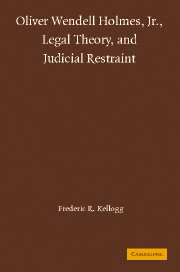Book contents
- Frontmatter
- Contents
- Preface
- 1 A Time for Law
- 2 Playing King: Connections and Misconceptions
- 3 Holmes's Conception of Law
- 4 Common Law Theory Revisited
- 5 Holmes and Legal Classification
- 6 The General Theory of Liability
- 7 Morals and Skepticism in Law
- 8 Judges, Principles, and Policy
- 9 Common Law Constitutionalism
- 10 Holmes's Theory in Retrospect
- 11 Conclusion
- Appendix
- Bibliography
- Index
4 - Common Law Theory Revisited
Published online by Cambridge University Press: 24 July 2009
- Frontmatter
- Contents
- Preface
- 1 A Time for Law
- 2 Playing King: Connections and Misconceptions
- 3 Holmes's Conception of Law
- 4 Common Law Theory Revisited
- 5 Holmes and Legal Classification
- 6 The General Theory of Liability
- 7 Morals and Skepticism in Law
- 8 Judges, Principles, and Policy
- 9 Common Law Constitutionalism
- 10 Holmes's Theory in Retrospect
- 11 Conclusion
- Appendix
- Bibliography
- Index
Summary
The common law is the absolute perfection of reason.
Sir Edward Coke, Institutes of the Laws of EnglandWould you have every man to every other man allege for law his own particular reason? There is not amongst men a universal reason agreed upon in any nation, besides the reason of him that hath the sovereign power. Yet though his reason be but the reason of one man, yet it is set up to supply the place of that universal reason, which is expounded to us by our Saviour in the Gospel; and consequently our King is to us the legislator both of statute-law, and of common-law.
Thomas Hobbes, A Dialogue between a Philosopher and a Student of the Common LawsI have claimed that Holmes's overall conception of law is rooted in the common law tradition in the novel theory he proposes. There are strands that recognizably link the two together. We may trace the origins of Holmes's common law vision back to Sir Edward Coke's comment above, associating common law with “the perfection of reason,” and just below it the rhetorical question inspired by it, put to an imaginary seventeenth-century common law theorist by Thomas Hobbes, in a manuscript written late in his life in the 1670s. The manuscript, with its questioning by the “Philosopher” of the “Law Student,” introduces the resolution that Hobbes gave to the problem of the relation between reason and authority in the law, one based on sovereign command and inhering in coherence and determinacy.
- Type
- Chapter
- Information
- Publisher: Cambridge University PressPrint publication year: 2006



